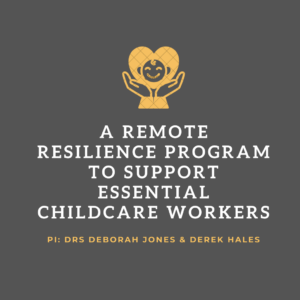Research Project Examples
![]()
It is critical to improving the engagement of at-risk and underserved families in evidence-based intervention. The “Technology to Enhance Treatment for Early Conduct Problems in Low Income Families” study aims to test the efficacy and cost effectiveness of a technology-enhanced service model to enhance the reach and impact of Behavioral Parent Training (BPT), which is the standard of care treatment for early onset disruptive behavior disorders. This study replicates and extends formative pilot work examining whether the use of smartphone technology can cost-effectively increase the engagement and, in turn, outcomes of one Behavioral Parent Training (BPT) program, Helping the Noncompliant Child (HNC; McMahon & Forehand, 2003).
PI: Deborah Jones, NIH R01MH100377; R34MH829567
![]()
Emotion regulation has been implicated in a broad range of adult and child outcomes, including early-onset. For example, parental difficulties with ER and difficulties helping children navigate and regulate emotion are linked to the etiology, maintenance, and severity of early-onset Behavior Disorders. Thus, another line of research at the Jones Lab explores the interrelationship of parent-child Emotion Regulation processes as a causal mechanism that predict the treatment process and outcome of Behavioral Parent Training. The team employs novel methods (vocal frequency analysis) to assess if and how parent emotion regulation and socialization shapes Behavioral Parent Training efficiency and child outcomes.
PI: Deborah Jones, NIH R21MH113887

Resilience interventions are a promising strategy to improve individuals’ mental health and well-being; however, emerging models too often rely on time and resource intensive in-person trainings tested with still largely preliminary research designs limiting confidence in their scalability and impact. This project will use a rigorous clustered randomized controlled efficacy trial to test a fully remotely delivered resilience intervention targeting childcare staff, a high-risk group of essential workers. Results will provide guidance for a scientifically sound, replicable resilience intervention that can be rapidly translated to workplaces that are chronically affected by structural inequities. This project, is a collaboration between the Center for Health Promotion and Disease Prevention (HPDP) at the University of North Carolina at Chapel Hill ( https://hpdp.unc.edu ) and Department of Psychology and Neuroscience. Dr. Jones is a multiple-PI on this project with Dr. Derek Hales, as well as their other colleagues on the Community Health and Wellness Resource Team (CHWRT) and others at HPDP and around the country.
PI: Deborah Jones, NICCH R01AT012620-01A1 (National Center for Complementary & Integrative Health)
